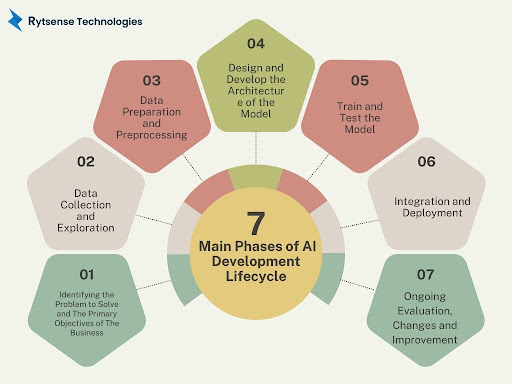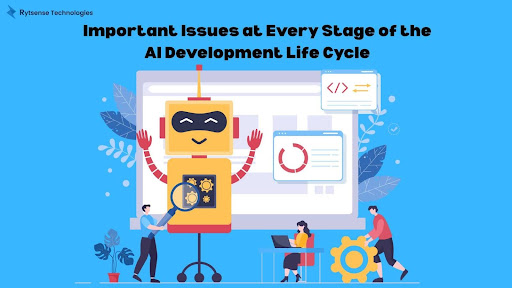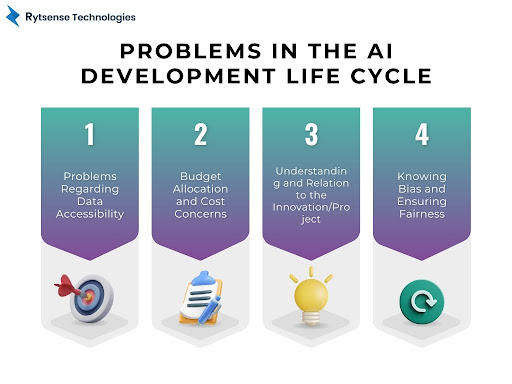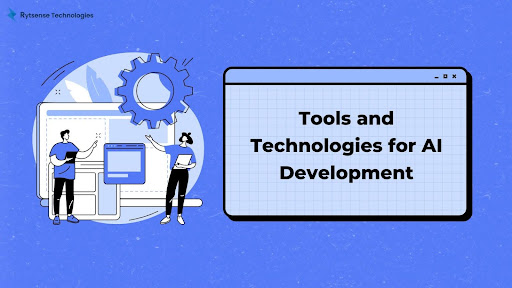-
Key Takeaways
- Knowing the complete AI development lifecycle with its 7 stages is crucial to select the right enterprise AI development firm
- Many AI projects do fail due to poor planning, importance of partners who follow structured AI development processes and knowing AI lifecycle stages
- Regulatory compliance should be embedded throughout the AI development cycle.
- Data preparation shows 80% development work which is crucial for choosing firms with proper expertise in data quality management and AI model lifecycle management.
- It needs continuous monitoring and improvement beyond deployment which makes a long-term partnership a critical factor in choosing the best AI development company in USA
Understanding AI Development Life Cycle: A Comprehensive Guide
The adoption of Artificial Intelligence technologies has remarkably changed business practices across different industries. According to The Stanford AI Index, 78% of organizations plan to incorporate AI in 2024, and McKinsey reports that 65 percent of respondents claim their organizations are actively leveraging generative AI, a figure that has almost doubled from our previous survey a mere ten months ago. For business leaders, understanding the AI advancement lifecycle is critical when choosing an AI development partner.
The AI Development Lifecycle refers to the systematic procedure involved in creating an intelligent computer system. It is similar to the example of building a house; one cannot succeed without following the set order of procedures.
The 7 Main Phases of AI Development Lifecycle:
1. Identifying the Problem - Define the matter that you will need the AI to assist you with.
2. Information Gathering - Collect the material that the AI will learn with.
3. Information Sorting - Structure and refine the data accurately.
4. Approach Selection - Determine the correct AI solution to the issue that you have.
5. Instruction and Evaluation - Train the AI and verify the accuracy of the operations.
6. Implementation - Set the AI in motion in the practical world.
7. Evaluation - Continuously observe and refine the AI in the long term.
Challenges Faced:
- Concerns of Data Integrity - Data may be untidy or lacking in content.
- Expenditure - Advanced computers and specialized personnel are always in demand for AI projects.
- Complicated for the Layman - AI uses advanced mathematics and programming.
- Prejudice Issues - AI is prone to bias and makes inappropriate decisions if not carefully constructed.
- Evolving Needs - Requirements tend to change during the course of development.
Impact:
Following the AI development lifecycle enables the construction of proper AI that attends to the needs of the business. They are critical for tracking the business requirements and validating the project scope. It is easier to identify the optimal return on investment given the carefully planned AI-enabled business projects.
Following this methodology guarantees that your AI functions appropriately and contributes tangible value to the business.
What Is The AI Development Lifecycle?
The AI development lifecycle is the framework that helps companies to plan, develop, and maintain their AI products. The ai lifecycle differ from traditional software development lifecycles in that there are some unique and very specialized phases that require to be done with extra care.
The AI development cycle consists of a number of crucial stages that help process raw data in intelligent systems to ease the solving of complex business problems. This systematic approach guarantees that AI solutions are not only grounded in sound engineering but are also etched into the corporate strategy and morality.
Each company has different needs in an AI development firm. Understanding the AI lifecycle stages empowers businesses to assess and select the development partner with the right specialization for each phase. To achieve the desired results, a capable AI development company is expected to have the right skills in all phases of AI development.
Insights into the AI Development Lifecycle
Due to its data-driven focus and the need for iterative improvements, the AI development lifecycle is fundamentally different from conventional software development. Each phase of the AI lifecycle is ethnically AI development firm’s best practices.
While searching for potential partners, firms need to identify entities that appreciate the complexities of the AI model lifecycle management. Emphasis should be placed on the firm’s experience with data accuracy challenges, AI-driven computation resource management, and the application of AI ethics and governance throughout the lifecycle.
Due to the nature of the AI development process being adaptive learning, a more comprehensive firm engagement model becomes important. This model allows AI strategies to be implemented, nurtured, and scaled as needed with the growth of the business. This approach allows the solutions to be properly integrated with business processes and ensures that evolving business needs are proactively addressed.
Read More:
Benefits of AI in Software DevelopmentStages of the AI Development Life Cycle

In the first stage of the AI development lifecycle, the business needs to identify a core problem and define the business-critical measurable KPIs. The AI initiative’s success largely hinges on the efforts put into this stage.
In a particular phase, the AI development team collaborates with stakeholders to know and understand the specific challenges and set SMART goals. The AI lifecycle begins with thorough problem identification that aligns with organizational goals and exists within the scope of resources.
Stage 2: Data Collection and Exploration
For any successful AI system, data acts as the backbone. The AI development cycle mandates comprehensive data collection from diverse sources, including internal databases, external APIs, and bespoke data collection tools.
This phase of the AI lifecycle stages focuses on exploratory data analysis to assess the data for its quality, ascertain its patterns, and determine the extent of biases. Data exploration is essential for developing strong AI models that are global-ready.
Stage 3: Data Preparation and Preprocessing
The AI development process stems from the machine learning paradigm and concentrates on preparing data with the right features to allow the application of the algorithms. The preparation phase itself is comprised of data sanitization, transformation, and feature engineering, and is the focus of this stage.
In the context of the AI model lifecycle management process, data preparation makes up about 80% of the total effort. AI development firms that have seasoned teams grasp the importance of this phase and employ cutting-edge approaches to ensure the data is of the highest quality.
Stage 4: Design and Develop the Architecture of the Model
In this phase of the AI development lifecycle, the teams choose suitable algorithms and model architectures that provide business value. The 7 stages of AI development have a focus on the computational power and the scalability of the system.
In the case of regression problems, classification, or deep learning tasks, different algorithms will be relevant. The AI lifecycle requires broad knowledge of a variety of machine learning frameworks and model development skills.
Stage 5: Train and Test the Model
In this stage of the AI development cycle, models are trained on datasets curated in the previous stage, and their performance is evaluated and tested. The models are built and evaluated iteratively.
In this AI lifecycle stage, evaluation of the model performance is done with the use of validation data. Sophisticated cross-validation and performance metrics evaluation are required. Experienced firms use thorough testing approaches to avoid overfitting and ensure generalization of the model.
Stage 6: Integration and Deployment
Deployment of the models means that the theoretical AI models are now business-ready. This stage of the AI development process is where the system needs to be integrated with the already existing ones and business infrastructure.
Deployment approaches could be cloud-based, border on the edge, or a mix of the two under AI model lifecycle management.
Stage 7: Ongoing Evaluation, Changes and Improvement
The last phase or stage of the AI development lifecycle is repetitive evaluation and refinement. This is an ongoing activity that guarantees the AI systems will function optimally to meet the evolving data trends and business needs.
In the 7 stages of AI development, there is an emphasis on the requirement for maintenance and updates. Effective AI applications necessitate constant surveillance of model efficacy and iterative improvement.
Ready to explore AI for your business? Partner with experts who understand every stage of the AI development lifecycle.

Important Issues at Every Stage of the AI Development Life Cycle

Ethics is an indispensable issue that cuts across the AI development lifecycle. Organizations have to deal with fairness, transparency, and accountability at every part of the AI lifecycle.
The strategies to deal with biases should be addressed in the AI development cycle and should be evaluated in the AI development lifecycle. AI development companies of repute understand the need to take ethical issues seriously and ensure that there is compliance with the law.
Compliance with Legal Requirements and Norms
The AI lifecycle stages need to meet the requirements of the particular sector and global norms. Various other standards, such as GDPR and HIPAA, have implications for the design and use of AI systems.
Established firms have an understanding of the compliance obligations within the AI model lifecycle management and ensure that the necessary controls are built at the design phase of the project.
Team Cooperation
A successful AI development process needs insight or input from various types of stakeholders like data scientists, AI practitioners, and many business executives. Good and effective collaboration is essential for shared understanding of project objectives and greatly aids in the understanding of the 7 stages of AI development.
Read More:
Latest AI developmentsProblems in the AI Development Life Cycle

Among the most notable issues in the AI development lifecycle are the accessibility as well as the quality of the data. Inadequate data quality is a common challenge. This problem is more prevalent in sophisticated AI models.
To overcome data quality issues in the AI lifecycle, many experienced practitioners employ advanced techniques in data governance. Well-established development companies rigorously enforce sophisticated AI development frameworks.
Budget Allocation and Cost Concerns
Meeting project constraints, defined in the AI development cycle, while also adhering to budget limitations, poses a unique challenge. This is particularly the case for deep learning frameworks. Successfully delivering project objectives while working within these limits is essential to the project’s success.
Using the cloud aids in alleviating budget and cost constraints while also optimizing the AI lifecycle stages. Developing scalable infrastructure to meet resource needs is a feature employed by most sophisticated AI development companies.
Understanding and Relation to the Innovation/Project
Collaborators working within the AI development process come from differing levels and fields of understanding regarding AI. Managing these expectations and conveying information clearly is pivotal in AI model lifecycle management.
Knowing Bias and Ensuring Fairness
AI systems have the potential to create bias, resulting in prejudiced outcomes and issues concerning compliance with regulations. Integrated planning and controlled monitoring for ongoing bias evaluation are critical at every step within the 7 stages of AI development.
Tools and Technologies for AI Development

An efficient and sophisticated model development and deployment framework and libraries are crucial in the AI development lifecycle. Among the sophisticated tools in the AI lifecycle, TensorFlow, PyTorch, and Scikit-learn are some of the most popular.
With each framework having its own set of advantages, execution within the AI development cycle varies. Well-established firms have broad knowledge of several platforms, which enable optimal selection for every project.
Platforms for AI Model Deployment
Transforming trained models into production systems remains a critical activity in the AI lifecycle stages. Amazon SageMaker, Google AI Platform, and Microsoft Azure Machine Learning are focused on all-inclusive model deployment and offer the most comprehensive yet better deployment solutions.
Maintaining alignment with proper organizational structure and performance requirements is crucial since the choice of deployment platform impacts the entire AI development process.
Data Annotation and Management Tools
During the AI model lifecycle management, supervised learning applications necessitate high-quality labeled data. Annotation processes are aided by Labelbox and SuperAnnotate, which help maintain workflow efficiency and streamlining throughout the data annotation process.
Building AI solutions requires precision at every step — from problem identification to deployment. Our team ensures your AI journey is seamless, scalable, and impactful.

AI Development Life Cycle Applications Across Different Industries
The AI development lifecycle is extensively applied in the healthcare industry in the creation of predictive analytics systems and healthcare diagnostic tools. These systems are capable of helping improve patient outcomes and therefore exhibit the true benefits of the 7 stages of AI development in key areas.
Healthcare AI systems incur hefty regulatory compliance throughout the AI lifecycle, making it very challenging to design the best solution. Leading AI development companies understand these regulatory hurdles and are capable of designing compliant industry solutions.
Finance: Fraud Detection and Risk Assessment
The AI development cycle is utilized by financial services to create advanced systems for fraud detection and risk assessment. AI development in these areas has to deal with stringent security requirements, especially for these applications.
Compliance with data protection mandates is a necessity during the AI lifecycle stages, including preserving audit trails for regulatory needs. These issues are handled best by more experienced companies, and they implement the proper measures and documentation for the processes.
Retail: Enhanced Client Interaction Through Tailored Suggestions
Retail businesses utilize the AI development lifecycle in building personalized suggestion systems to improve the overall experience and sales. These systems illustrate the economic benefits achievable through effective AI model lifecycle management.
Manufacturing: Predictive Maintenance
Manufacturing firms utilize the AI development process to set up predictive maintenance systems and address operational downtimes. These installations highlight the industrial value of the 7 stages of AI development.
Read More:
AI Decision MakingWhy Choose Rytsense Technologies?
In the hunt for the best AI development company in USA, Rytsense Technologies emerges to offer quality of service as an AI development services provider. Our offerings cut across the entire AI development lifecycle, guaranteeing project success through every stage, from ideation to execution.
Our team is well-versed in the rich intricacies of the AI lifecycle and applies them to every stage of the AI development cycle. We ensure to retain the most up-to-date knowledge on technologies and frameworks, observing principled policies on AI development and compliance with laws.
Rytsense Technologies assists throughout the entire AI development process, from the first consultation through to maintenance and continuous optimization. Guided by our seasoned experts, our clients navigate through the AI lifecycle stages, emphasizing business value achievement.
Our strategy on AI model lifecycle management prioritizes scaling, dependability, and sustainability over time. It is clear that mastering AI’s 7 stages of development demands meticulous attention to detail and competencies unique to every stage. We ensure that all of our projects are done flawlessly.
With Rytsense Technologies, you can trust that all of your artificial intelligence needs and all of your business objectives will be seamlessly integrated and met. Along with AI development lifecycle solutions, we offer strong technical skills complemented by industry insight to ensure that your business goals are fully integrated.
Conclusion
In order to choose the right AI development firm, a business must appreciate the intricacies of the AI development lifecycle and assess prospective partners based on their competence in all AI lifecycle stages. The AI development cycle is based on profound insights, sophisticated technologies, and sound ethics that only seasoned firms can provide.
Adequately responding to the business opportunity posed by AI demand calls for a proper organization of the work. The AI development process comprises a variety of stages, each needing a distinct set of expertise and approaches. Companies must pay attention to the entire AI model lifecycle management framework when choosing new partners to ensure success.
Understanding the 7 stages of AI development helps build powerful solutions. Companies that grasp the stages and their relationships are better positioned to select developers and realize value from AI.
Accomplishments in AI development are only possible with partners who appreciate the entire AI lifecycle and can manage its challenges. Pick a development firm that demonstrates a thorough reputation in all stages and is committed to ethical and developmental AI standards.

The Author
Karthikeyan
Co Founder, Rytsense Technologies